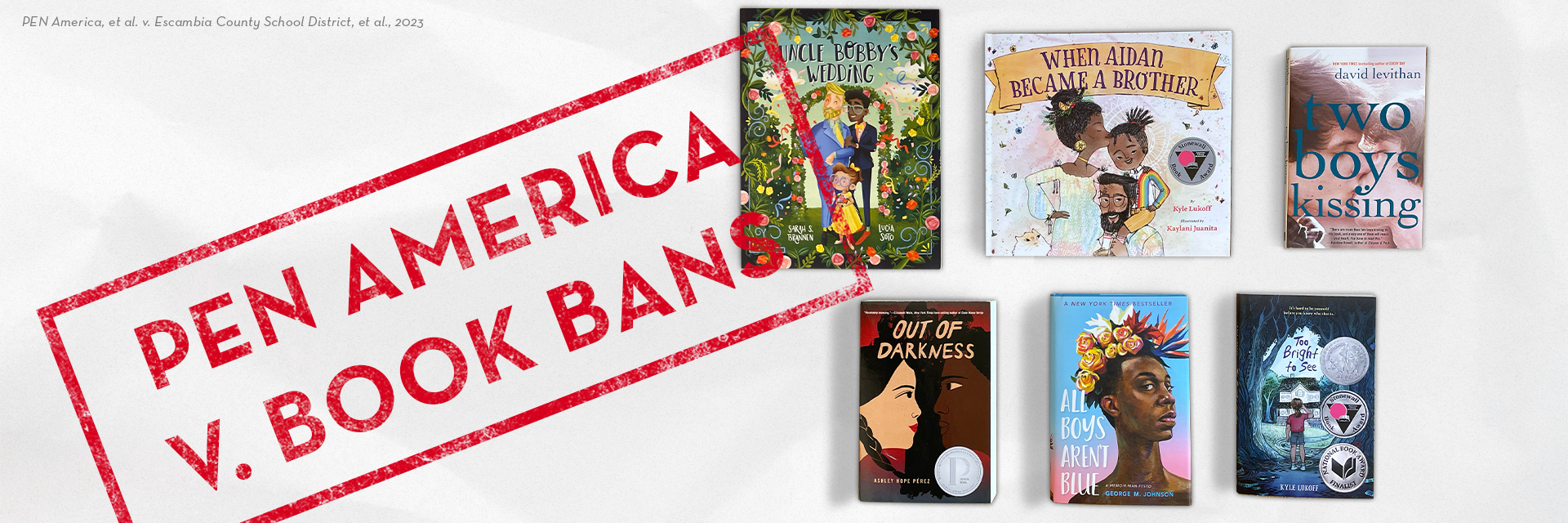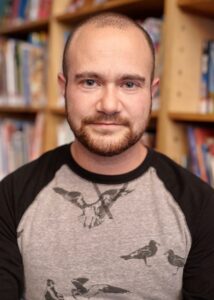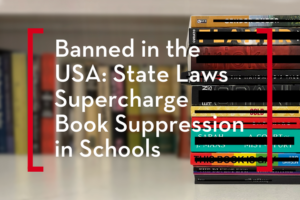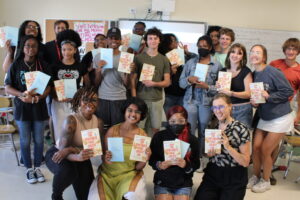
PEN America v. Escambia County School District
Updated January 31, 2024
In May 2023, PEN America, Penguin Random House, and a diverse group of authors joined with parents and students in Escambia County, Florida, to file a federal lawsuit challenging removals and restrictions of books from school libraries that violate their rights to free speech and equal protection under the law.
This lawsuit brings together authors whose books have been removed or restricted and parents and students in the district who cannot access the books, in a groundbreaking challenge to unlawful censorship.
Ensuring that students have access to books on a wide range of topics and that express a diversity of viewpoints is a core function of public education — preparing students to be thoughtful and engaged citizens.
The lawsuit says the Escambia County School District and School Board violated the First Amendment rights of the students, authors, and publishers by removing books “based on ideological objections to their contents or disagreement with their messages or themes.” The books targeted for removal disproportionately addressed themes and messages related to race and LGBTQ+ identity. Florida has one of the highest rates of book removals and restrictions in the country, as researched by PEN America and documented in its Index of School Book Bans.
In January 2024, Judge T. Kent Wetherell of the United States District Court for the Northern District of Florida heard oral arguments on the school district’s motion to dismiss. In an unexpected order from the bench, he denied the school district’s motion to dismiss on the First Amendment claims, finding standing for all plaintiffs and rejecting the school district’s argument that the book removals constituted government speech not subject to First Amendment scrutiny. Judge Wetherell dismissed the claim that the removals also violated the Equal Protection Clause of the constitution.
Read the entire amended complaint >>
Read the press release on the filing>>
Read Judge Wetherell’s order on the motion to dismiss >>
Read the press release on Judge Wetherell’s order >>
If you’d like to help PEN America document and fight book bans, support our work today.
FAQ
The complaint alleges that Escambia County’s book removals (I) constitute viewpoint discrimination barred under the First Amendment, (II) violate students’ right to receive information under the First Amendment, and (III) were motivated by discriminatory animus based on race, gender, or sexual orientation in violation of the Equal Protection Clause of the Fourteenth Amendment.
Per Judge Wetherell’s January order on the motion to dismiss, the two First Amendment claims will move forward.
Judge Wetherell’s order means that the lawsuit can move forward on the two First Amendment counts. It is not a final decision on the merits. In determining whether or not to grant a motion to dismiss, the court must accept all of the plaintiffs’ factual allegations as true and decide whether or not they have stated a plausible legal claim. Judge Wetherell found that all plaintiffs had standing, that the case was ripe and not moot, and that the plaintiffs stated plausible First Amendment claims.
Judge Wetherell’s order is an important victory for this case and for book banning cases around the country. Previous plaintiffs have struggled to establish standing in similar cases, so this opinion provides support for other similar claims and similarly situated potential plaintiffs. Judge Wetherell’s determination that PEN America has standing on behalf of its member authors and for itself as a literary organization is also significant, bolstering PEN America’s ability to work for and protect the rights of authors.
Judge Wetherell’s rejection of the government speech doctrine is also significant, as state governments and local agencies have turned to the government speech doctrine in an attempt to immunize their censorship of literature from Constitutional scrutiny. The government speech doctrine stipulates that the First Amendment does limit the government’s ability to restrict its own speech when the government speaks for itself. Judge Wetherell rejected outright the school district’s argument that the government speech doctrine applies to library book removals, noting that applying the doctrine in this context would set a dangerous precedent.Judge Wetherell’s rejection of this dangerous idea provides further support for challenges against educational censorship nationwide.
Now that the case is moving forward to discovery, our author plaintiffs and our parent plaintiffs will have an opportunity to demonstrate to the court (and the public) the detrimental effects of these book bans and the importance of access to diverse literature.
In short, it doesn’t. The removals at issue took place before HB 1069 went into effect. The school district argued that the special magistrate process required by 1069, which went into effect on July 1, took final decision-making out of the school district’s hands and was therefore fatal to the claims in the complaint. However, Judge Wetherell agreed with the plaintiffs’ argument that the process had no bearing on the issues framed by the motion to dismiss because the process does not shift the decision as to whether or not to remove a book to the state.
While 1069 does not have any bearing on the specific issues laid out in the complaint, it is nonetheless having a tremendous impact on libraries in the Escambia County School District. In response to 1069, more than 1600 titles have been banned pending investigation in the county, including Anne Frank’s Diary of a Young Girl, Bill O’Reilly’s two books, The Autobiography of Malcolm X, The Guinness Book of World Records, The Adventures and Memoirs of Sherlock Holmes, and five dictionaries.
Authors Sarah Brannen (Uncle Bobby’s Wedding), George M. Johnson (All Boys Aren’t Blue), David Levithan (Two Boys Kissing), Kyle Lukoff (When Aidan Became a Brother, Too Bright to See), and Ashley Hope Pérez (Out of Darkness) all have written books that have been ordered removed from libraries in the school district and/or subjected to restricted access within such libraries and kept from students as a result.
Restricting access to books deprives the authors of the opportunity to engage with readers and disseminate their ideas to their intended audiences.
PEN America stands at the intersection of literature and human rights to protect open expression in the United States and worldwide. We champion the freedom to write, recognizing the power of the word to transform the world. Our mission is to unite writers and their allies to celebrate creative expression and defend the liberties that make it possible.
PEN America is a nonprofit, member-based organization that represents authors throughout the United States. Members of PEN include Judy Blume (Forever…), Chimamanda Ngozi Adichie (Half of a Yellow Sun), Margaret Atwood (The Handmaid’s Tale), Alex Gino (Melissa), John Green (Looking for Alaska), Carmen Maria Machado (In the Dream House), Khaled Hosseini (The Kite Runner), Susan Kuklin (Beyond Magenta), and Jodi Picoult (Nineteen Minutes). Founded in 1922, PEN America works to ensure that people everywhere have the freedom to create literature, to convey information and ideas, to express their views, and to access the views, ideas, and literatures of others. PEN America has joined with parents, students, and authors to vindicate their rights and to ensure that public school libraries continue to be spaces dedicated to the exploration and dissemination of a wide variety of ideas, points of view, and experiences, free from government viewpoint discrimination and discrimination based upon race, sexuality, or gender identity.
As the world’s largest trade book publisher, Penguin Random House is resolute in its commitment to free expression and protecting the freedom to read. With a mission to create books for everyone, more than 300 imprints, 16,000+ new titles published annually, and brands on six continents, Penguin Random House is home to diverse stories with wide-spanning perspectives and supports their authors in reaching as many readers as possible. Penguin Random House comprises adult and children’s fiction and nonfiction print and digital English- German- and Spanish-language trade book publishing businesses in more than 20 countries worldwide. With more than 700 million print, audio and eBooks sold annually, Penguin Random House’s publishing lists include more than 80 Nobel Prize laureates, numerous Newbery and Caldecott awards, and many of the world’s most widely read authors.
Penguin Random House publishes hundreds of authors with banned or challenged books, including plaintiffs in the lawsuit: David Levithan, Kyle Lukoff and Ashley Hope Perez; as well as the late Toni Morrison, who was also targeted in Escambia County’s bans.
The Escambia County School District is at the heart of the efforts to remove and restrict books in Florida. In September 2022, a teacher in one of the district schools filed challenges to over 100 book titles requesting their removal from school libraries. The district responded by moving these challenged books to “restricted” areas, where students may not peruse them or check them out without first receiving parental permission. Over the ensuing eight months District leaders voted to permanently remove 10 books from school libraries, in many cases overriding the recommendation of district review committees formed to evaluate them. Nearly 200 books have been targeted in the district in the past year, and as of the time of filing, publicly available data indicates more than 65% remain restricted indefinitely, requiring specific parental permission, across elementary, middle, and high schools.
Escambia County epitomizes the censorship efforts in Florida that are being mimicked in school districts across the country. Though some of these districts’ removals and restrictions have proved temporary, many like those in Escambia have involved summarily removing books before any considered evaluation took place. Prohibiting access to books “pending investigation” is contrary to best practice guidance for the review of challenged books in public schools. Further, by burdening students with the stigma of requesting special access to books labeled as inappropriate, the District creates a profound chilling effect that discourages students and undermines their ability to fully exercise their First Amendment right to openly access information.
Nearly 200 books have been targeted in the district in the past year. The books targeted in Escambia County include classic works of literature such as The Bluest Eye, Slaughterhouse-Five, and The Kite Runner, and run the gamut from picture books to young adult titles. A substantial portion of the titles address LGBTQ themes and/or deal with issues of race or racism.
The challenges included claims that books were pornographic (Judy Blume’s Forever…), their purpose was “indoctrination” (David Levithan’s Two Boys Kissing; George M. Johnson’s All Boys Aren’t Blue), they promoted a “woke agenda” (Jerry Craft’s New Kid), contained “glorified pedophilia” (Toni Morrison’s The Bluest Eye), were “race-baiting” (Mark Weakland’s When Wilma Rudolph Played Basketball), or contained “alternate sexual ideologies” (Sarah Brannen’s Uncle Bobby’s Wedding) or “alternate gender identities” (Kyle Lukoff’s Too Bright to See). A novel about love and racism in 1930s Texas, Out of Darkness by Ashley Hope Perez, was mischaracterized as aiming to “sexually excite.” The picture book And Tango Makes Three by Justin Richardson and Peter Parnell allegedly served an “LGBTQ agenda using penguins.”
The school district initially ignored its policies, which require books to remain on shelves during review by a school-level panel before a potential district-wide review and subsequent appeal to the school board. Instead, the district restricted access to all challenged books by requiring an “opt-in” from parents until the books could be reviewed–a sudden and dramatic change. A further policy change lifted the automatic restriction for all books, but kept restrictions to any title where the challenge alleged that the book contains “pornography”–irrespective of the validity of such an allegation or the length of the review period.
The lawsuit asks that the district return the books to shelves immediately and permanently, and be prohibited from removing the books again. The lawsuit also seeks attorney fees and expenses.
Meet the Author Plaintiffs
 Ashley Hope Pérez is the author of award-winning novels for young adults, including Out of Darkness, The Knife and the Butterfly, and What Can’t Wait. Out of Darkness was described by The New York Times Book Review as a “layered tale of color lines, love and struggle in an East Texas oil town,” and was selected as a best book of the year by both Kirkus and School Library Journal. It received a 2016 Printz Honor for Literary Excellence in Young Adult Fiction from the American Library Association, the 2016 Tomás Rivera Book Award, and the 2016 Américas Award. Despite being published in 2015 and never challenged until 2021, Out of Darkness has become one of the most frequently banned books in the U.S. over the past two years.
Ashley Hope Pérez is the author of award-winning novels for young adults, including Out of Darkness, The Knife and the Butterfly, and What Can’t Wait. Out of Darkness was described by The New York Times Book Review as a “layered tale of color lines, love and struggle in an East Texas oil town,” and was selected as a best book of the year by both Kirkus and School Library Journal. It received a 2016 Printz Honor for Literary Excellence in Young Adult Fiction from the American Library Association, the 2016 Tomás Rivera Book Award, and the 2016 Américas Award. Despite being published in 2015 and never challenged until 2021, Out of Darkness has become one of the most frequently banned books in the U.S. over the past two years.
Pérez is a former public high school English teacher, a parent, and a professor of world literature at The Ohio State University.
 David Levithan is the author of over twenty books for kids and young adults, including the award-winning novels Boy Meets Boy, Two Boys Kissing, and Every Day. In 2016, he won the American Library Association’s Margaret A. Edwards Award for his meaningful contribution to young adult literature.
David Levithan is the author of over twenty books for kids and young adults, including the award-winning novels Boy Meets Boy, Two Boys Kissing, and Every Day. In 2016, he won the American Library Association’s Margaret A. Edwards Award for his meaningful contribution to young adult literature.
 Kyle Lukoff is the author of many books for young readers. His debut middle-grade novel, Too Bright To See, received a Newbery honor, the Stonewall award, and was a National Book Award finalist. His picture book When Aidan Became A Brother also won the Stonewall, and his book Call Me Max has been banned in schools across the country. He has forthcoming books about apologies, vegetables, death, and lots of other topics. While becoming a writer he worked as a bookseller for ten years, and then nine more years as a school librarian.
Kyle Lukoff is the author of many books for young readers. His debut middle-grade novel, Too Bright To See, received a Newbery honor, the Stonewall award, and was a National Book Award finalist. His picture book When Aidan Became A Brother also won the Stonewall, and his book Call Me Max has been banned in schools across the country. He has forthcoming books about apologies, vegetables, death, and lots of other topics. While becoming a writer he worked as a bookseller for ten years, and then nine more years as a school librarian.
 Sarah S. Brannen is the author of Uncle Bobby’s Wedding. When it was first published in 2008, Uncle Bobby’s Wedding was the first picture book about a same-sex wedding published by a U.S. publisher. The new edition, published in 2020, was named one of the 100 best children’s books of the past 100 years by Booktrust. It was named one of the best books of the year by Kirkus and Bank Street.
Sarah S. Brannen is the author of Uncle Bobby’s Wedding. When it was first published in 2008, Uncle Bobby’s Wedding was the first picture book about a same-sex wedding published by a U.S. publisher. The new edition, published in 2020, was named one of the 100 best children’s books of the past 100 years by Booktrust. It was named one of the best books of the year by Kirkus and Bank Street.
Brannen also wrote and illustrated A Perfect Day, Bear Needs Help, Madame Martine, and Madame Martine Breaks the Rules. She has illustrated many books for children, including the Sibert Award honor book Summertime Sleepers; Seashells: More Than a Home; and Feathers: Not Just For Flying, all written by Melissa Stewart.
 George M Johnson is an award-winning Black non-binary writer, author, and executive producer located in the LA area. They are the author of the New York Times bestselling young adult memoir All Boys Aren’t Blue, which discusses their adolescence growing up as a young Black queer boy in New Jersey through a series of powerful essays. The book was optioned for television by Gabrielle Union.
George M Johnson is an award-winning Black non-binary writer, author, and executive producer located in the LA area. They are the author of the New York Times bestselling young adult memoir All Boys Aren’t Blue, which discusses their adolescence growing up as a young Black queer boy in New Jersey through a series of powerful essays. The book was optioned for television by Gabrielle Union.
As a former journalist, George has written for major outlets including Teen Vogue, Entertainment Tonight, NBC, and Buzzfeed. In 2019 they were awarded the Salute to Excellence Award by the National Association of Black Journalists for their article “When Racism Anchors your Health” in Vice Magazine.
George was listed on The Root 100 Most Influential African Americans in 2020. The Out 100 Most Influential LGBTQ People in 2021. And in 2022 was honored as one of the TIME 100 Next Most Influential People in the World.
Their second memoir We Are Not Broken was released in September of 2021. It received the Carter G. Woodson Award which recognizes books that “accurately and sensitively depict the experience of one or more historically marginalized racial/ethnic groups in the United States.” The book also received the Nonfiction Honor Book in the YA category from the International Literacy Association.
In 2021 they wrote and executive produced the dramatic reading of All Boys Aren’t Blue starring Jenifer Lewis and Dyllon Burnside which received a 2022 Special Recognition Award from GLAAD, and which has been nominated for an Emmy in the Daytime Special category, which will be presented at the Daytime Emmy ceremony in June 2023.
George is also a proud HBCU alum twice over, and a member of Alpha Phi Alpha Fraternity Incorporated.
Our Commentary
New Report: 28% Rise in School Book Bans Over First Half of 2022-23 School Year
“The heavy-handed tactics of state legislators are mandating book bans, plain and simple,” said Suzanne Nossel, Chief Executive Officer of PEN America. “Some politicians like Florida Governor Ron DeSantis… More
PEN America Urges Tennessee Gov. Lee to Reject Legislation that Would Subject Publishers and Book Distributors to Criminal Penalties for ‘Obscene Materials’ Sent to Public Schools
Jonathan Friedman, director of PEN America’s Free Expression and Education program, issued the following comments on the bill: "Regardless of what the supporters of this law say, it serves little… More
Suppressing Words and History Harms the Rising Generation
"Over the past 18 months, PEN America has recorded the removal of hundreds of books that touch on race and racism and books that include characters of color from… More
Scheduled Vote to Close Library Sends an Alarming Message that Government Can Choose What People Read
Kasey Meehan, program director, Freedom to Read project at PEN America, issued the following statement: “The proposal to close the Llano library system is not only an end-run to avoid… More
“Alarming” Proposed Florida Law Heightens Oversight of Classroom Libraries, Expands Mechanism to Challenge a Book
“This is an alarming piece of legislation that would make it possible for a single parent in a district to enact a ban on any book simply by challenging… More
PEN America Condemns Reported Dismissal of Teacher Who Blew the Whistle and Published Videos of Empty Florida Library Shelves
“Reports that the Governor's commentary may have led to the dismissal of a teacher are shocking,” said Kate Ruane, director of US Free Expression Programs at PEN America. “If… More
Brooklyn Public Library and PEN America Teaming Up to Train High School Students to Defend Against Book Bans, Promote the Freedom to Read
Student registrants may attend as many of the four sessions as they would like, however, full attendance and participation are required to receive a certificate of professional achievement from… More











